Related Research Articles
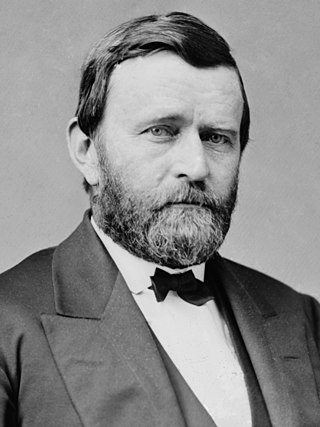
The 1868 United States presidential election was the 21st quadrennial presidential election, held on Tuesday, November 3, 1868. In the first election of the Reconstruction Era, Republican nominee Ulysses S. Grant defeated Horatio Seymour of the Democratic Party. It was the first presidential election to take place after the conclusion of the American Civil War and the abolition of slavery. It was the first election in which African Americans could vote in the reconstructed Southern states, in accordance with the First Reconstruction Act.

The Reconstruction era was a period in United States history following the American Civil War, dominated by the legal, social, and political challenges of abolishing slavery and reintegrating the former Confederate States of America into the United States. During this period, three amendments were added to the United States Constitution to grant equal civil rights to the newly freed slaves.

Pinckney Benton Stewart Pinchback was an American publisher, politician, and Union Army officer. Pinchback was the second African American to serve as governor and lieutenant governor of a U.S. state. A Republican, Pinchback served as acting governor of Louisiana from December 9, 1872, to January 13, 1873. He was one of the most prominent African-American officeholders during the Reconstruction Era.

Jeff Davis was an American Democratic politician who served as the 20th governor of Arkansas from 1901 to 1907 and in the U.S. Senate from 1907 to 1913. He took office as one of Arkansas's first New South governors and proved to be one of the state's most polarizing figures. Davis used his silver tongue and aptitude for demagoguery to exploit existing feelings of agrarian frustration among poor white farmers and thus built a large populist appeal. However, since Davis often blamed city-dwellers, blacks, and Yankees for problems on the farm, the state was quickly and ardently split into "pro-Davis" or "anti-Davis" factions.
The Radical Republicans were a faction within the Republican Party originating from the party's founding in 1854—some six years before the Civil War—until the Compromise of 1877, which effectively ended Reconstruction. They called themselves "Radicals" because of their goal of immediate, complete, and permanent eradication of slavery in the United States. They were opposed during the war by the Moderate Republicans, and by the Democratic Party. Radicals led efforts after the war to establish civil rights for former slaves and fully implement emancipation. After unsuccessful measures in 1866 resulted in violence against former slaves in the rebel states, Radicals pushed the Fourteenth Amendment for statutory protections through Congress. They opposed allowing ex-Confederate officers to retake political power in the Southern U.S., and emphasized equality, civil rights and voting rights for the "freedmen", i.e., former slaves who had been freed during or after the Civil War by the Emancipation Proclamation and the Thirteenth Amendment.
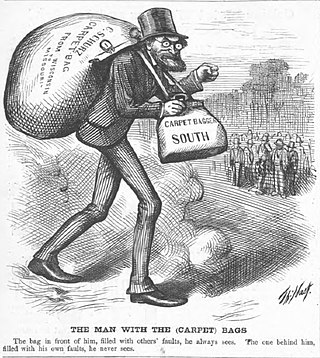
In the history of the United States, carpetbagger is a largely historical pejorative used by Southerners to describe opportunistic Northerners who came to the Southern states after the American Civil War, who were perceived to be exploiting the local populace for their own financial, political, and/or social gain. The term broadly included both individuals who sought to promote Republican politics and individuals who saw business and political opportunities because of the chaotic state of the local economies following the war. In practice, the term carpetbagger was often applied to any Northerners who were present in the South during the Reconstruction Era (1865–1877). The term is closely associated with "scalawag", a similarly pejorative word used to describe native white Southerners who supported the Republican Party-led Reconstruction.
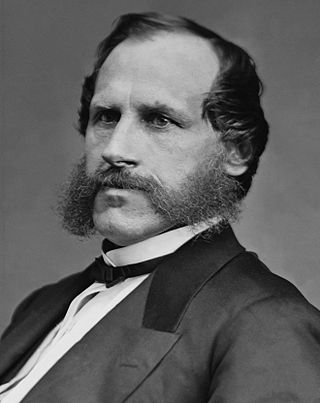
George Henry Williams was an American judge and politician. He served as chief justice of the Oregon Supreme Court, was the 32nd Attorney General of the United States, and was elected Oregon's U.S. senator, and served one term. Williams, as U.S. senator, authored and supported legislation that allowed the U.S. military to be deployed in Reconstruction of the southern states to allow for an orderly process of re-admittance into the United States. Williams was the first presidential Cabinet member to be appointed from the Pacific Coast. As attorney general under President Ulysses S. Grant, Williams continued the prosecutions that shut down the Ku Klux Klan. He had to contend with controversial election disputes in Reconstructed southern states. President Grant and Williams legally recognized P. B. S. Pinchback as the first African American state governor. Williams ruled that the Virginius, a gun-running ship delivering men and munitions to Cuban revolutionaries, which was captured by Spain during the Virginius Affair, did not have the right to bear the U.S. flag. However, he also argued that Spain did not have the right to execute American crew members. Nominated for Supreme Court Chief Justice by President Grant, Williams failed to be confirmed by the U.S. Senate primarily due to Williams's opposition to U.S. Attorney A. C. Gibbs, his former law partner, who refused to stop investigating Republican fraud in the special congressional election that resulted in a victory for Democrat James Nesmith.
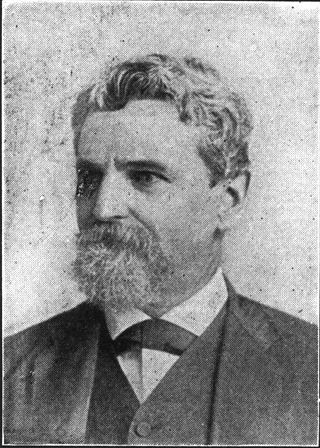
Francis Redding Tillou Nicholls was an American attorney, politician, judge, and a brigadier general in the Confederate States Army during the American Civil War. He served two terms as the 28th Governor of Louisiana, first from 1876 to 1880 after the Reconstruction era ended and from 1888 to 1892.
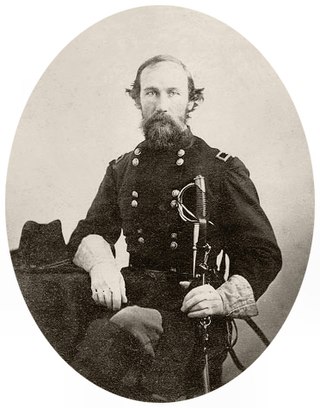
Edmund Jackson Davis was an American lawyer, soldier, and politician. Davis was a Southern Unionist and a general in the Union Army in the American Civil War. He also served as the 14th Governor of Texas from 1870 to 1874, during the Reconstruction era. Reviled by many Texans during and after the Civil War as a traitor for his open support for the North and his attempts to break up Texas into several Northern-controlled states, Davis is known for leasing prisoners to private corporations to alleviate state budget shortfalls.
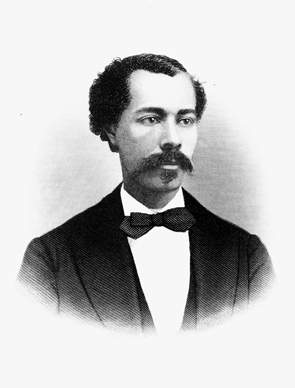
John Roy Lynch was an American writer, attorney, military officer, author, and Republican politician who served as Speaker of the Mississippi House of Representatives and represented Mississippi in the United States House of Representatives.

The New Orleans Massacre of 1866 occurred on July 30, when a peaceful demonstration of mostly Black Freedmen was set upon by a mob of white rioters, many of whom had been soldiers of the recently defeated Confederate States of America, leading to a full-scale massacre. The violence erupted outside the Mechanics Institute, site of a reconvened Louisiana Constitutional Convention. According to the official report, a total of 38 were killed and 146 wounded, of whom 34 dead and 119 wounded were Black Freedmen. Unofficial estimates were higher. Gilles Vandal estimated 40 to 50 Black Americans were killed and more than 150 Black Americans wounded. Others have claimed nearly 200 were killed. In addition, three white convention attendees were killed, as was one white protester.

Hamilton Rowan Gamble was an American jurist and politician who served as the Chief Justice of the Missouri Supreme Court at the time of the Dred Scott case in 1852. Although his colleagues voted to overturn the 28-year precedent in Missouri of "once free always free," Gamble wrote a dissenting opinion. During the American Civil War, he was appointed as the Governor of Missouri by a Constitutional Convention after Union forces captured the state capital at Jefferson City and deposed the elected governor, Claiborne Jackson.

Henry Clay Warmoth was an American attorney and veteran Civil War officer in the Union Army who was elected governor and state representative of Louisiana. A Republican, he was 26 years old when elected as 23rd Governor of Louisiana, one of the youngest governors elected in United States history. He served during the early Reconstruction Era, from 1868 to 1872.

Louisiana was a dominant population center in the southwest of the Confederate States of America, controlling the wealthy trade center of New Orleans, and contributing the French Creole and Cajun populations to the demographic composition of a predominantly Anglo-American country. In the antebellum period, Louisiana was a slave state, where enslaved African Americans had comprised the majority of the population during the eighteenth-century French and Spanish dominations. By the time the United States acquired the territory (1803) and Louisiana became a state (1812), the institution of slavery was entrenched. By 1860, 47% of the state's population were enslaved, though the state also had one of the largest free black populations in the United States. Much of the white population, particularly in the cities, supported slavery, while pockets of support for the U.S. and its government existed in the more rural areas.

George Michael Decker Hahn, was an attorney, politician, publisher and planter in New Orleans, Louisiana. He served twice in Congress during two widely separated periods, elected first as a Unionist Democratic Congressman in 1862, as a Republican to the U.S. Senate in 1865, and later as a Republican to the U.S. House of Representatives in 1884. He was elected as the 19th Governor of Louisiana, serving from 1864 to 1865 during the American Civil War, when the state was occupied by Union troops. He was the first German-born governor in the United States, and is also claimed as the first ethnic Jewish governor. By that time he was a practicing Episcopalian.

James Madison Wells was elected Lieutenant Governor and became the 20th Governor of Louisiana during Reconstruction.

Benjamin Franklin Flanders was a teacher, politician and planter in New Orleans, Louisiana. In 1867, he was appointed by the military commander as the 21st Governor of Louisiana during Reconstruction, a position which he held for some six months. He was the second and, as of 2023, the last Republican mayor of New Orleans, Louisiana.

The Republican Party of Louisiana(LAGOP) (French: Parti républicain de Louisiane, Spanish: Partido Republicano de Luisiana) is the affiliate of the Republican Party in the U.S. state of Louisiana. Its chair is Louis Gurvich, who was elected in 2018. It is currently the dominant party in the state, controlling all but one of Louisiana's six U.S. House seats, both U.S. Senate seats, and both houses of the state legislature. However Republicans recaptured the governorship in the 2023 Louisiana gubernatorial election with Republican Jeff Landry outright winning with 51.56% of the vote and avoiding a runoff.

James Lewis was an African-American soldier and politician in Louisiana. Born into slavery and of mixed race, during the American Civil War he left a position as steward on a Confederate steamboat to move to New Orleans, which had been taken over by Union troops. There he helped organize the First Louisiana Volunteer Native Guards, becoming captain of Company K and serving until 1864. After the war he became politically active in the Republican Party during the Reconstruction era, where he was an ally of several other leading men of color in the city and state.
References
- 1 2 3 Wetta, Francis Joseph (1977). The Louisiana Scalawags. (Volumes I and II) (PhD thesis). Louisiana State University.
- ↑ Tunnell, Ted (1984-11-01). Crucible of Reconstruction: War, Radicalism, and Race in Louisiana, 1862–1877. LSU Press. ISBN 9780807154038.
- ↑ "DEPARTMENT OF THE GULF.; Proceedings and Incidents in New Orleans. SLAVERY AND THE FREED NEGROES.THE FREE STATE CONVENTION. ABUSE OF THE FREED PEOPLE. A REBEL RETAINS HIS SERVANTS PROPERTY. GOVERNOR OF THE STATE. SECRETARY OF STATE. STATE TREASURER. ATTORNEY-GENERAL. AUDITOR OF PUBLIC ACCOUNTS. STATE SUPERINTENDENT OF PUBLIC EDUCATION". The New York Times. 1864-04-26. ISSN 0362-4331 . Retrieved 2018-02-26.
- ↑ "Louisiana Former Attorneys General". National Association of Attorneys General. Retrieved 2018-02-26.
- ↑ Caskey, Willie Malvin (1938). Secession and restoration of Louisiana. Louisiana State University Press. p. 108.